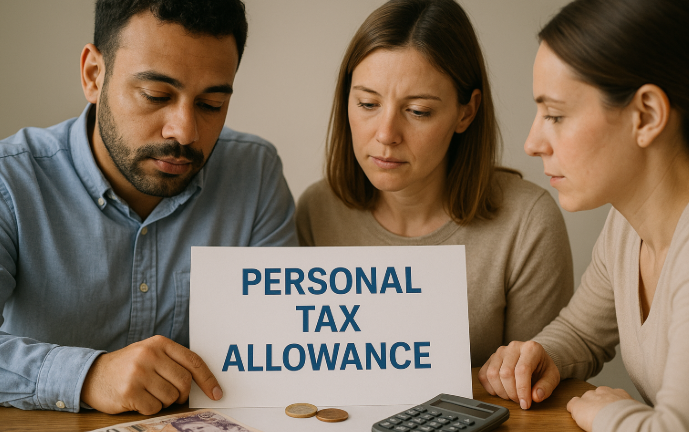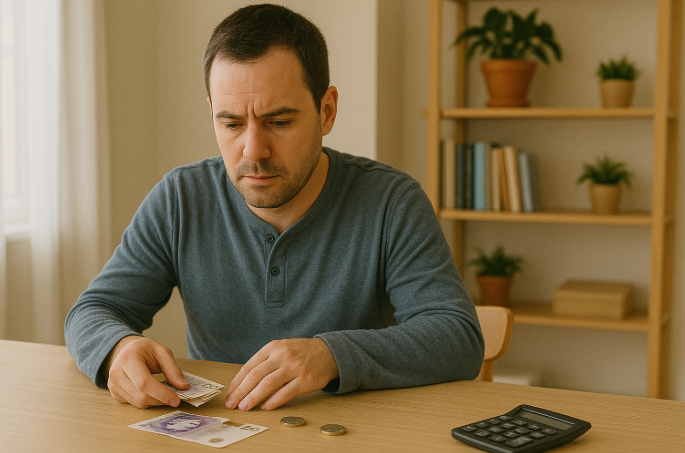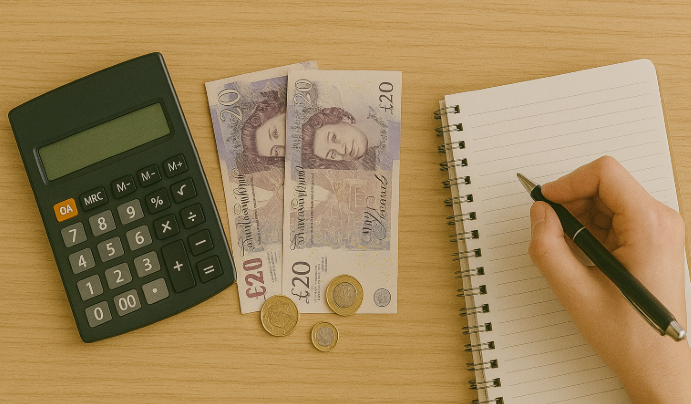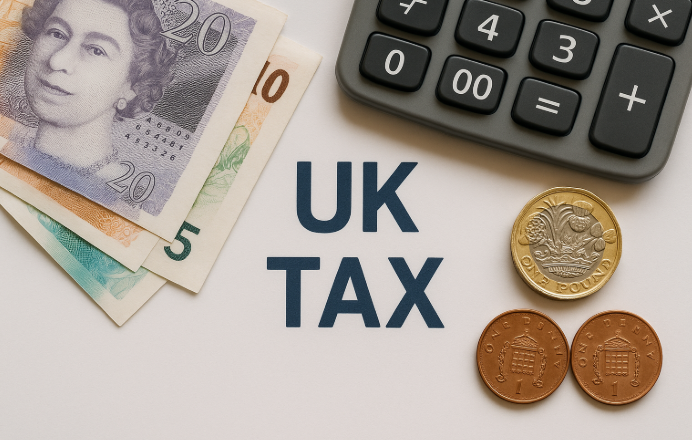In the UK, understanding how much can you earn before paying tax per month is essential for budgeting and financial planning. For UK employees, the monthly tax-free threshold is based on the annual Personal Allowance, currently set at £12,570. This article explains monthly tax-free earnings, National Insurance, the impact on take-home pay, and offers tips for maximizing net income.
What is the minimum monthly salary to pay tax?
To begin paying Income Tax, your monthly earnings must exceed £1,047.50.
-
-
Earning £1,048 or more per month triggers the Income Tax charge.
-
For most incomes beyond this threshold, the tax rate begins at the basic rate of 20%.
-
If you stay under this monthly threshold, you remain within your tax-free limit.
-
How much can you earn per month before paying Income Tax?
The current monthly tax-free limit is £1,047.50.
-
-
Your pay will be taxed at the basic rate of 20% if it exceeds this amount.
-
This continues until you reach the higher-rate threshold of £50,270 annually (about £4,189 monthly).
-
You will then begin paying 40% of your income that is in the higher rate range.
-
What is the Personal Allowance and how does it affect monthly earnings?

What is the Personal Allowance?
The amount of money you are permitted to make each tax year without having to pay income tax is known as your personal allowance. For the 2025/26 tax year, the standard Personal Allowance remains at £12,570.
-
It applies to most taxpayers in the UK.
-
You do not pay income tax if your income is less than this amount.
-
The allowance can be lower if your income exceeds £100,000 annually (reduced by £1 for every £2 earned above this limit).
-
When you earn £125,140 or more, you can withdraw all of your Personal Allowance.
How is that converted to a monthly threshold?
To determine how much you can earn tax-free per month, simply divide the annual allowance:
£12,570 ÷ 12 = £1,047.50/month
-
-
If you earn £1,047.50 or less per month, you won’t pay any Income Tax.
-
This helps individuals on monthly salaries understand their tax-free threshold.
-
For those paid weekly, the equivalent is approximately £242.50/week.
-
What is the Personal Tax Allowance for 2025/2026?
-
The Personal Allowance for 2025/26 is £12,570.
-
This threshold has been frozen since 2021 and is expected to stay frozen until at least April 2028, affecting millions through fiscal drag (more people paying tax as incomes rise).
Also Read About: Private Health Insurance Tax
How much can you earn before paying National Insurance per month?
National Insurance Contributions (NICs) are paid when your monthly income surpasses £1,048 (Primary Threshold).
NI rate structure for employees:
- Pay 8% NICs on incomes between £1,048 and £4,189.
-
Over £4,189 per month: On earnings beyond this threshold, pay 2% NICs.
Note: National Insurance helps fund state benefits like pensions and healthcare.
How much can I earn a year before tax self-employed?
If you’re self-employed, the same £12,570 Personal Allowance applies, but there are additional tax considerations:
-
Allowable business expenses can be deducted from income to reduce taxable profits.
-
Income Tax applies to profits (not turnover) above £12,570.
National Insurance for self-employed:
-
Class 2 NI: Payable if profits exceed £6,725/year – flat rate of approx. £3.70/week
-
Class 4 NI:
-
9% on profits between £12,570 and £50,270
-
2% on profits above £50,270
-
Being self-employed also means managing your own tax payments through Self Assessment.
What happens if annual income exceeds £100,000?

Exceeding £100,000/year triggers the tapered Personal Allowance, where you start losing the £12,570 tax-free threshold.
-
Tapering Rule: For every £2 over £100,000, £1 of the allowance is removed.
-
You lose all of your Personal Allowance when your salary hits £125,140.
Effective Marginal Tax Rate:
Between £100,000 and £125,140, you’re effectively taxed at 60% on income in this range.
-
-
To reduce this burden, consider:
-
Making charitable donations
-
Increasing pension contributions
-
Using salary sacrifice
-
-
Also Read About: Can I Give My Son £50,000 in the UK?
What is the monthly take-home pay after tax and NI?
| Gross Monthly Salary | Income Tax | NI | Approx. Take-Home |
|---|---|---|---|
| £1,050 | £0 | £0 | £1,050 |
| £2,000 | £191 | £76 | £1,733 |
| £3,000 | £391 | £191 | £2,418 |
How calculations work:
- Income Tax: (Gross – £1,047.50) × 20%
- NI: (Gross – £1,048) × 8%
How to avoid paying 40% tax?
Income over £50,270 annually is subject to the 40% higher-rate tax. While it can’t always be avoided, several legal strategies can help reduce or delay reaching this threshold:
-
-
Increase Pension Contributions: Contributions to your pension reduce your taxable income. You can contribute up to 100% of your earnings (up to the annual limit of £60,000 in 2025/26) and receive tax relief.
-
Use Salary Sacrifice Schemes: These schemes allow you to exchange part of your salary for non-cash benefits such as pensions, childcare vouchers, or cycle-to-work plans—reducing your taxable income.
-
Claim Tax Reliefs: Ensure you’re claiming all available deductions, such as job expenses, professional subscriptions, and charitable donations under Gift Aid.
-
Distribute Income Tax-Efficiently: If you’re self-employed or run a business:
-
Divide the remaining amount into dividends, which are subject to reduced tax rates, and pay yourself a modest wage.
-
Split income with a spouse or civil partner to utilise their lower tax bands.
-
-
Invest in ISAs: Any income or gains from Cash ISAs or Stocks & Shares ISAs are completely tax-free.
-
Are there additional tax-free allowances employees should know?
Yes, several allowances can reduce your tax bill:
-
-
Marriage Allowance: If one spouse earns less than the Personal Allowance and the other is a basic-rate taxpayer, you can transfer £1,260 of unused allowance—saving up to £252/year.
-
Blind Person’s Allowance: An additional allowance of £3,130, increasing your total tax-free income if you’re registered blind or severely sight-impaired.
-
Savings Allowance:
-
£1,000/year for basic-rate taxpayers
-
£500/year for higher-rate taxpayers
-
£0 for additional-rate taxpayers
-
-
Dividend Allowance: First £500/year of dividend income is tax-free, useful for company directors or investors.
-
How much do I need to earn to do a tax return?
A self-assessment tax return is required if you:
-
-
Earn more than £100,000 annually
-
Are self-employed, even part-time
-
Get untaxed income from sources like overseas income, dividends, or rental earnings.
-
Make capital gains above the annual allowance
-
Claim tax reliefs not handled via PAYE (e.g., higher-rate relief on pensions)
-
What ages do you start paying taxes in the UK?
- Income Tax: Starts from age 16 and over, but only if your income exceeds the Personal Allowance (£12,570).
- National Insurance: Begins at age 16, if you earn over £1,048/month or £12,570/year from employment.
Note: Students and part-time workers can still be taxed if earnings exceed thresholds.
UK employees: what practical tips boost take-home pay?

To maximise net income:
-
-
Boost Pension Contributions: Reduce taxable income and increase long-term savings.
-
Reduce your tax and national insurance costs by using salary sacrifice.
-
Claim Allowances: Apply for Marriage Allowance or Blind Person’s Allowance.
-
Claim Work Expenses: Uniforms, tools, home-working costs, and travel can be deductible.
-
Check Tax Code: Ensure it reflects your current situation to avoid under- or overpaying.
-
How to earn tax-free money?
There are several ways to earn income that’s entirely tax-free:
-
-
Utilize ISAs: Up to £20,000/year can be saved or invested tax-free.
-
Keep Your Total Income Under £12,570 Per Year to Stay Within Your Personal Allowance.
-
Make Use of Allowances Combine your personal, marital, savings, and dividend allowances sensibly.
-
Tax-Free Sources:
-
Premium Bonds winnings
-
Lottery or gambling winnings
-
Some insurance payouts and compensation
-
Certain state benefits (e.g., Child Benefit below the high-income threshold)
-
-
Do you have to pay tax on cash in hand work?
Yes. All income, including cash-in-hand, must be declared to HMRC.
-
-
Failing to report cash income is tax evasion and is illegal.
-
Register as self-employed or declare additional income via Self Assessment if you receive regular payments outside of your employment.
-
How much is normal tax?
The UK has a progressive tax system:
-
0%: Up to £12,570 (Personal Allowance)
-
20%: £12,571 to £50,270 (Basic Rate)
-
40%: £50,271 to £125,140 (Higher Rate)
-
45%: Over £125,140 (Additional Rate)
Each band only applies to the portion of income within it—not the entire income.
What earnings are tax-free?

You won’t pay tax on the following:
-
-
Earnings within your Personal Allowance
-
Interest within your Savings Allowance
-
Dividends up to the Dividend Allowance
-
Tax-free benefits such as some mileage reimbursements
-
Certain state benefits (e.g., Housing Benefit, Child Benefit under threshold)
-
One-off payments like compensation or gifts (subject to limits)
-
How much bank interest is tax-free?
Depending on your income tax band:
-
- Basic-rate taxpayer (20%): Tax-free interest up to £1,000 annually
- Higher-rate taxpayer (40%): Up to £500/year
-
Additional-rate taxpayer (45%): No savings allowance
How to Avoid Interest Tax?
-
Use ISAs: All interest earned through ISA savings is exempt from taxes.
-
Split Savings: Spread savings between spouses or civil partners to utilize both allowances.
-
Hold NS&I Premium Bonds: No interest, but tax-free prize winnings.
-
Keep Under Allowance: Monitor total interest to ensure it doesn’t exceed your limit.
How Can I Save 100% Tax?
While it’s not always possible to eliminate tax completely, you can legally avoid paying any tax by:
-
Keeping income within your Personal Allowance
-
Saving via ISAs and Premium Bonds
-
Making pension contributions with tax relief
-
Using tax-efficient investments like:
-
Venture Capital Trusts (VCTs) provide a 30% tax deduction.
-
Enterprise Investment Scheme (EIS) – offers tax relief and capital gains exemptions (higher risk)
-
Where Can I Put My Money Tax-Free?
Consider these tax-free options to grow or protect your wealth:
-
Cash ISAs: Tax-free savings interest
-
Shares and Stocks ISAs: Capital gains and dividends that are tax-free
- Lifetime ISAs (LISAs): With a 25% government incentive, you may save up to £4,000 year tax-free for a property or retirement.
-
Premium Bonds: Gains are tax-free but there is no interest.
-
Workplace or Personal Pensions: Receive tax relief on contributions and tax-deferred growth
Conclusion
Understanding how much can you earn before paying tax per month in the UK helps optimise net income. Monthly thresholds are:
- £1,047.50 for Income Tax
- £1,048 for National Insurance
In addition, you pay 8–2% NI and 20% tax. Over £100k in tapering allowances are faced by high earners. To lower your taxable income, make use of savings plans, pension contributions, and allowances.
FAQs
Can I work part-time and avoid paying tax?
Yes, as long as your income remains below £1,047.50 per month, you won’t pay Income Tax.
Do students pay tax on part-time jobs?
Students are subject to the same thresholds. If income exceeds the allowance, tax and NI apply.
Is the Personal Allowance the same for everyone?
Generally, yes. But it tapers for income over £100,000 and may vary based on individual allowances.
What happens if I overpay tax?
You can claim a refund from HMRC by submitting a tax return or using a P800 form.
When does the tax year start and end in the UK?
The tax year in the UK begins on April 6 and ends on April 5 of the following year.

I’m Adam Milne, a business writer and co-author at UKBusinessMag.co.uk. I’m passionate about simplifying complex topics—whether it’s tax, startup strategy, or digital marketing—so that entrepreneurs can take action with confidence. With years of experience in small business consultancy, I bring a practical perspective to every piece I write, helping readers turn ideas into results.



